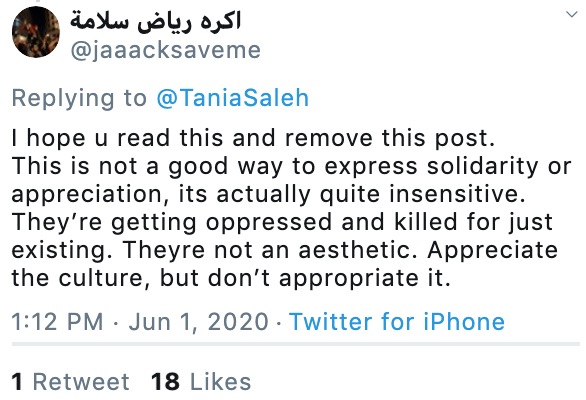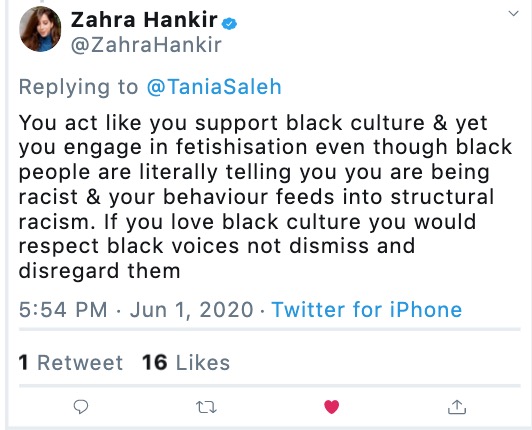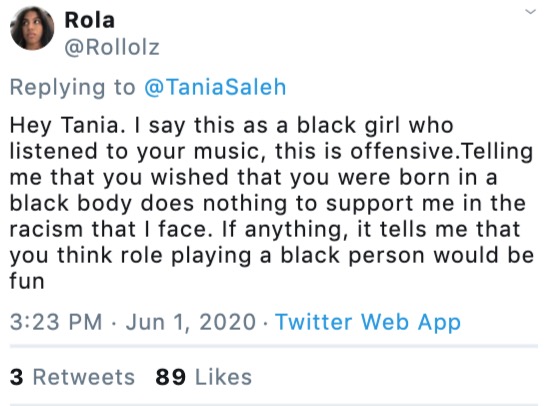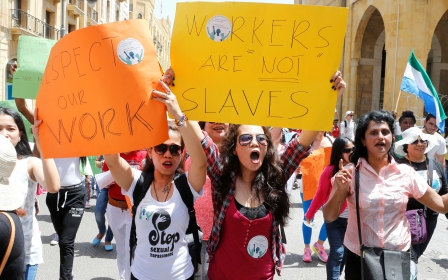'Blackface' Arab stars spark backlash over tasteless solidarity with US protests
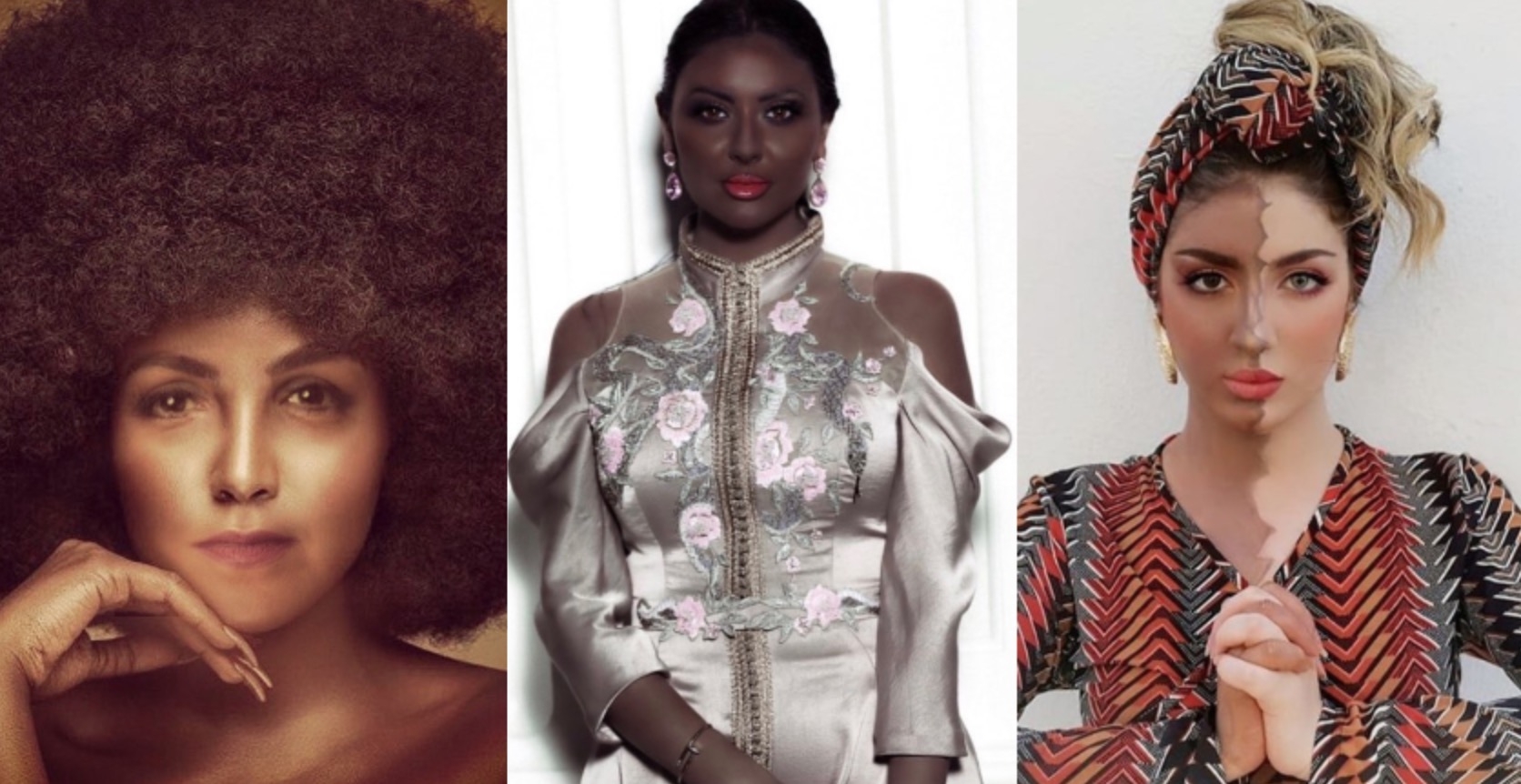
Several Arab actors and singers have come under fire after sharing darkened images of themselves in the wake of the protests sweeping the US over the police killing of George Floyd, with social media users slamming their use of "blackface".
Lebanese singer and songwriter Tania Saleh posted a photo of herself this week to Twitter, with her face superimposed on that of a black woman with an afro hairstyle.
In the caption, the singer states that she wishes she was black and that she sends her support to those protesting for justice in the US.
The image, which was shared in support of nationwide protests taking place in the United States after the killing of Floyd by the police in Minneapolis, has been called tone-deaf and racist.
New MEE newsletter: Jerusalem Dispatch
Sign up to get the latest insights and analysis on Israel-Palestine, alongside Turkey Unpacked and other MEE newsletters
Some have called the image "fetishisation" of black culture and have asked her to express solidarity in other ways that do not feed into racist tropes.
The singer has over 16,000 followers on Instagram where the photo was also shared, despite thousands of comments asking her to take the image down.
“I have posted this with love and I will not remove it despite all of your offensive comments,” the singer wrote in comments under her photo.
One user responded: “This is the worst post I’ve seen in my life by far. Blackface, cultural appropriation, highjacking a movement, and wishing you were black just to 'fit in' with the current political context is astoundingly disrespectful. If you want to support the cause, go donate or raise awareness. Don’t photoshop a photo of yourself just to promote your brand.”
Saleh defended herself by saying the photo she shared was a show of admiration and respect for black people's culture and that she meant no offence. The singer has not removed the photo from her social media platforms.
"Blackface" refers to a practice that took place in the US in the 19th and early 20th century where people would paint themselves black and exaggerate their features to mock and insult black people for entertainment.
The practice, which was widely used in shows and performances, draws on derogatory stereotypes of black people and ethnic minorities.
A black Lebanese social media user, Lama Elamine, reacted to Saleh’s image by discussing in a video what it’s like to be black in Lebanon in the current climate.
“You wish you were black...come on let’s see what it’s like to be black in Lebanon. There was a young black basketball player who was on her way home when she was confronted by a group of men who wanted to hit her...just because she’s black and she won.
"Then there’s a young girl who wants to get into theatre and acting at school, but the teacher won’t allow her because she’s black."
The video, which has been watched thousands of times, has been praised and used to highlight issues of inequality in Lebanon.
Moroccan actor Mariam Hussein also shared an image of herself with darkened skin on her Instagram account, where she has over 640,000 followers.
In the caption of her image, the actor shared a reference to a religious verse from the Quran, which states that there is no superiority of one race over another, except through piety.
The image caused a backlash from thousands of people online who told her to educate herself on the history of blackface and why it causes offence.
In another example, Algerian actor and singer Souhila Ben Lachhab, who has over one million followers on Instagram, painted her face half black using make-up in an effort to stand in solidarity with US demonstrators.
“Racist people are the true black-hearted ones. They are black on the inside, though they do not know it,” she wrote in her caption.
Lebanese stars have previously been condemned for their use of blackface. In 2018, Myriam Fares appeared with a darkened skin tone in her music video "Goumi’ (Get Up)", which was set in a jungle.
Social media users called out the pop star for her ‘ignorant and racist’ video and also said it was an example of cultural appropriation.
Kafala system
Social media users have used the photos to raise awareness on the kafala system, a common form of sponsorship used across the Middle East that limits the freedoms of foreign workers, and ongoing racism in Lebanon.
Earlier this year, Lebanon was urged to end the "abusive" kafala system after the suspected suicide of a domestic worker.
Lebanon has nearly 250,000 migrant domestic workers who are given the right to work in the country via the kafala system.
While workers under Lebanon's Labour Law are guaranteed certain rights, under the system, if an employer ends a contract with a domestic worker - even in cases of abuse - the worker loses their migration status.
Last year, hundreds of workers in Lebanon took to the streets in protest, demanding an end to the controversial system, which does not allow workers to travel, resign, change jobs or return home without the permission of the family who hired them.
Middle East Eye delivers independent and unrivalled coverage and analysis of the Middle East, North Africa and beyond. To learn more about republishing this content and the associated fees, please fill out this form. More about MEE can be found here.


